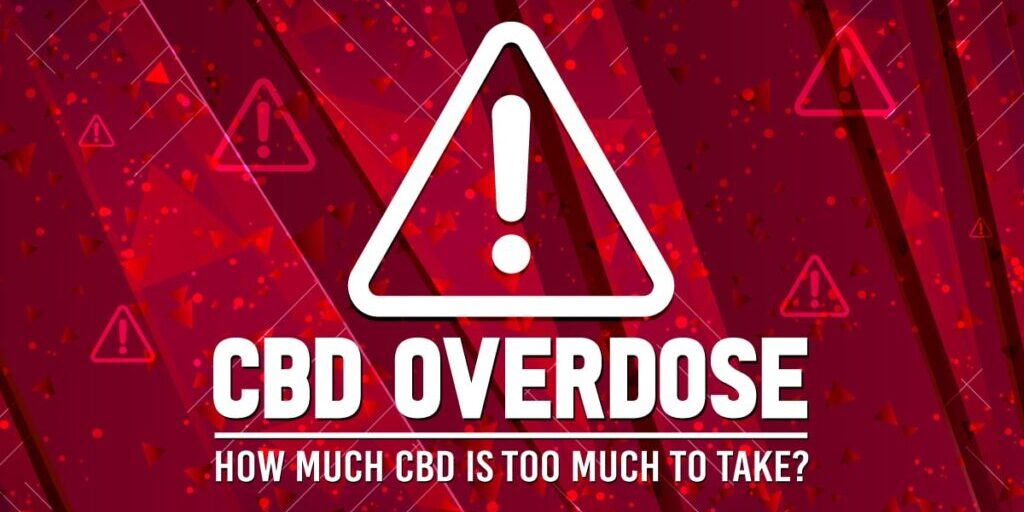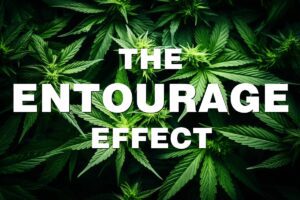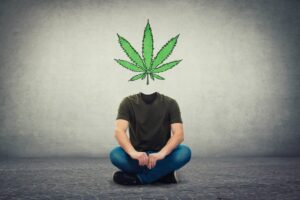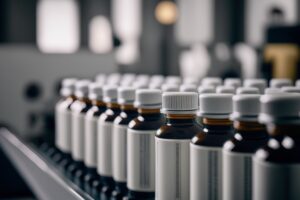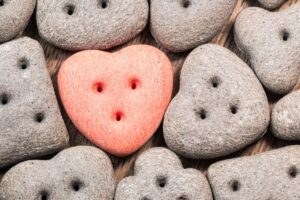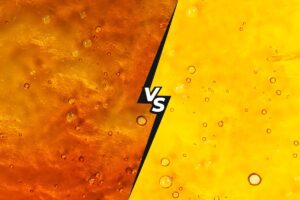Can You OD On CBD?
It’s not easy to take enough CBD to overdose because most retail products do not have enough of the active ingredient Cannabidiol (CBD) in them for it to be possible. You can also rest assured that there are no reports of lethal effects from taking too much CBD. No deaths from CBD overdose have been reported.
But like anything else, it is possible to have too much of a good thing. That’s why we’ve created this CBD Overdose Guide to help you get the facts about CBD. So keep reading to find out how much CBD is too much to take and what constitutes a CBD overdose.
How much CBD is too much to take?
We’ve reviewed hundreds of CBD clinical studies to assess the safety and side effects of many different CBD dosage ranges. The vast majority of scientific research shows CBD is non-toxic, non-habit forming, and generally well-tolerated by healthy adult users like you! Furthermore, no matter how much CBD you take, it will never make you feel “high” or “stoned” because CBD is not psychoactive like its marijuana counterpart, THC.
So, how much CBD is too much for you to take? It depends on your body weight. For example, a CBD user who weighs 100 lbs has a different maximum dosage range than someone who weighs 300 lbs. Safe CBD dosages normally range from 25 mg to 450 mg per dose. Excessive and extreme CBD dosages — which are also body-weight dependent — range from 450 mg to over 2,100 mg per dose.
Use the CBD Overdose Chart below to find the established safe limits of CBD intake based on your current body weight. This chart is for educational purposes only. It is not medical advice. Consult your primary healthcare practitioner if you think you’ve taken too much CBD and are experiencing side effects.
CBD Overdose Chart: Safe, Excessive, and Extreme Dosage Ranges |
|||
|---|---|---|---|
| Body Weight | Safe Dose | Excessive Dose | Extreme Dose |
| 100 lbs (45 kg) |
Up to 150 mg | 450 mg | 700 mg |
| 125 lbs (57 kg) |
Up to 188 mg | 562 mg | 875 mg |
| 150 lbs (68 kg) |
Up to 225 mg | 675 mg | 1,050 mg |
| 175 lbs (79 kg) |
Up to 262 mg | 787 mg | 1,225 mg |
| 200 lbs (91 kg) |
Up to 300 mg | 900 mg | 1,400 mg |
| 250 lbs (113 kg) |
Up to 375 mg | 1,125 mg | 1,750 mg |
| 300+ lbs (136 kg) |
Up to 450 mg | 1,350 mg | 2,100 mg |
|
Safe CBD dosages are well-tolerated and typically do not cause adverse reactions for over 99% of users. Excessive CBD dosages are at least three times larger than established safe limits for your body weight and may cause side effects that include dry mouth, increased thirst, drowsiness, sleepiness, appetite changes, or stomach upset. Extreme CBD dosages are at least seven times larger than established safe limits for your body weight and are more likely to cause side effects such as excess thirst, loss of appetite, stomach upset, dizziness, fatigue, sleepiness, heavy sedation, diarrhea, or vomiting depending on how large of a dose was taken. Chart data has been interpreted from a meta-analysis of clinical studies. Do not use this chart for a medical assessment. Consult with your primary healthcare practitioner if you think you've taken too much CBD and are experiencing side effects. |
|||
CBD maintains an impeccable safety profile backed by research studies, clinical trials, and toxicity investigations.
Taking CBD in dosage ranges found in the green column will rarely cause side effects. Less than 0.5% of users report adverse reactions when taking the recommended CBD dose according to their body weight. These are often similar to side effects reported for placebo and may include dry mouth, increased thirst, appetite changes, stomach upset, or drowsiness.
Excessive CBD doses in the yellow column are at least three times larger than the recommended safe CBD dosage range. Taking an excessive CBD dose may increase the potential for side effects, but it is still not likely that most people will experience any. Side effects from excessive CBD doses are reported as mild to moderate and include dry mouth, increased thirst, drowsiness, sleepiness, appetite changes, or stomach upset.
Extreme CBD doses, which may be considered “overdoses” because they are significantly beyond established safe dosage limits, are listed in the red column. They are at least seven times larger than the recommended safe CBD dose. Extreme doses of CBD are very likely to cause one or more of the following side effects:
- Excess thirst
- Loss of appetite
- Stomach upset
- Dizziness
- Fatigue
- Sleepiness
- Heavy sedation
- Diarrhea
- Vomiting
The good news is that taking too much CBD has never been shown to cause irreparable human harm. No deaths due to CBD overdose have been reported. Also noteworthy is that when CBD side effects occur, they are transient and usually dissipate within two to six hours after the last dose.
RELATED: Not sure how much CBD you should take? Check out the Cannabiva CBD Dosage Chart to find the suggested starting dose for your CBD Wellness Plan!
Do you think you are experiencing side effects after taking an excessive or extreme dose of CBD? Discontinue use and seek the advice of a qualified healthcare professional to get an adequate medical opinion. Make sure to note how much CBD you ingested and how long ago you took your last dose when communicating with your doctor.
Calculate CBD dosage thresholds by your exact body weight
Drill down and get a more precise CBD dosage measurement based on your body weight using another CBD overdose chart. The following overdose chart breaks down safe, excessive, and extreme CBD dosages by the pound:
CBD Overdose Chart By the Pound: Establish Safe Usage Limits and Potential Overdose Ranges |
|||
|---|---|---|---|
| Single Unit Weight Metric | Safe Dose | Excessive Dose | Extreme Dose |
| 1 lbs U.S. Imperial Pound |
0.1 to 1.5 mg / lbs | 4.5 mg / lbs | 10.5 mg / lbs |
| 1 kg Metric Kilogram |
0.1 to 3.3 mg / kg | 9.9 mg / kg | 23.1 mg / kg |
|
Safe CBD dosages are well-tolerated and typically do not cause adverse reactions for over 99% of users. Excessive CBD dosages are at least three times larger than established safe limits for your body weight and may cause side effects that include dry mouth, increased thirst, drowsiness, sleepiness, appetite changes, or stomach upset. Extreme CBD dosages are at least seven times larger than established safe limits for your body weight and are more likely to cause side effects such as excess thirst, loss of appetite, stomach upset, dizziness, fatigue, sleepiness, heavy sedation, diarrhea, or vomiting depending on how large of a dose was taken. Chart data has been interpreted from a meta-analysis of clinical studies. Do not use this chart for a medical assessment. Consult with your primary healthcare practitioner if you think you've taken too much CBD and are experiencing side effects. |
|||
Now use the simple formula below to calculate more precise CBD dosage thresholds that you should avoid:
[TOTAL BODY WEIGHT] x [PER POUND DOSAGE LISTED IN CHART] = THRESHOLD DOSE
Let’s calculate an excessive dose for someone who weighs 119 lbs as an example. Here’s how that looks using the formula:
Example #1:
Total Weight: 119 lbs
Threshold Dosage: Excessive
[119 lbs] x [4.5 mg] = 535.5 mg
The person in the above example should not exceed 535.5 mg CBD per single dose to avoid taking an excessive amount.
Next, we will calculate the extreme CBD dosage threshold for someone who weighs 234 lbs:
Example #2:
Total Weight: 234 lbs
Threshold Dosage: Extreme
[234 lbs] x [10.5 mg] = 2457 mg
Now you know how to calculate the precise CBD dose thresholds just for you according to your exact body weight! All that’s left to do is plug in your weight and the dosage thresholds listed in the chart above to determine if you’ve taken a safe, excessive, or extreme dose of CBD. More likely than not, you will find that you are within the established safe limits of CBD intake.
What are the signs of taking too much CBD?
The signs of taking too much CBD are easy to spot because CBD rarely causes side effects when used as directed. Less than 0.5% of users will experience CBD side effects if they stick to the established safe dosage limits. Furthermore, all side effects observed from taking CBD are transient, meaning they are temporary and only last for about two to six hours after the last dose.
Taking an excessive CBD dose is not likely to cause side effects in most people. Users who do experience side effects from excessive CBD doses should look out for the following:
- Dry mouth
- Increased thirst
- Drowsiness
- Sleepiness
- Appetite changes
- Stomach upset
CBD users who take extreme doses are likely to experience one or more of the following side effects:
- Excess thirst
- Loss of appetite
- Stomach upset
- Dizziness
- Fatigue
- Sleepiness
- Heavy sedation
- Diarrhea
- Vomiting
The intensity of side effects you experience depends on the size of the CBD dose taken, your total body weight, and your tolerance to CBD. Side effects from extreme doses of CBD have an increased intensity compared to those from safe or excessive amounts.
What to do if you’ve taken too much CBD
Do not take more CBD if you’ve discovered that you’ve taken too much. Side effects will temporarily last about two to six hours before the CBD wears off.
The best thing to do if you have taken too much CBD is to consult a qualified medical professional. Although, you must contact a healthcare provider if you have taken an extreme CBD dose that falls into the red column. Some CBD users who take extreme amounts of CBD experience significant side effects that require medical intervention. If needed, you should have ready access to adequate medical supervision as your CBD dose peaks (usually within one to three hours after taking your last dose).
How can I avoid taking too much CBD?
It’s easy to avoid taking too much CBD. Here are three simple steps you can take to use CBD correctly:
- Figure out how much CBD is in the product you plan to take
Knowing how much CBD is in each dose allows you to stay within the established safe usage limits. - Always start low and go slow when first beginning CBD
Gradually increasing and moderating your CBD intake until you find the most effective daily dose is called titration. - Find the perfect CBD dose for you based on your body weight
Use the Cannabiva CBD Dosage Chart to calculate a safe CBD dose that’s right for you.
You may no longer feel its effects after two to six hours, but that doesn’t mean the CBD you’ve taken is entirely out of your system. Avoid taking more CBD for at least 24 hours if you’ve taken an excessive or extreme dose.
Many factors affect how long CBD stays in your system, including CBD half-life, your diet and metabolism, CBD dosage, frequency of CBD dose, how you take your CBD, and any preexisting medical conditions you may have. See how long CBD may stay in your system to learn more.
CBD Overdose Warnings
CBD is like any other medicine. It can provide life-changing benefits but can also cause adverse events if not used as directed. How CBD affects you varies based on several factors:
- The amount of CBD you take in a single dose
- Your body’s unique response to CBD and other cannabinoids
- Interactions with other medicines or drugs you may be taking
What should you do if you’ve taken CBD and are concerned it was too much?
First, don’t panic. CBD is a very forgiving natural medicine that leaves plenty of room for you to experiment safely. In addition, most retail products available to consumers do not contain enough CBD for you to overdose, so it’s unlikely that you’ve exceeded the established safe dosage limits.
It’s easy to check whether or not you have taken too much CBD using these simple steps:
- Estimate how much CBD you’ve taken
Check the total concentration of your CBD product and divide by the number of servings to get the single dose amount. See the Cannabiva Dosage Chart section that deals with finding the right CBD strength for you if you need help calculating how much CBD is in each product dose. - Determine if your CBD dose is considered safe, excessive, or extreme
Use the CBD Overdose Chart at the top of this page to find the established safe limits of CBD intake based on body weight categories. Check if your CBD dose falls within the green, yellow, or red columns. Or use the modified CBD overdose chart to calculate a more precise amount according to your body weight. - Notice if you are experiencing any side effects
Taking too much CBD may increase the potential occurrence of side effects. Review common side effects and determine if you are experiencing any.
You should speak with your doctor if you experience any side effects after taking CBD. However, you must consult a qualified healthcare professional if you have taken an extreme CBD dose that falls into the red column because some users may experience significant side effects that require medical attention.
Even though CBD may cause serious side effects after taking excessive or extreme doses, clinical studies show they are not fatal. There are no deaths reported from taking too much CBD.
Can you take too much CBD?
It is possible to have too much of a good thing, including CBD. That’s why starting low and going slow is so important when beginning CBD.
Taking too much CBD in a single dose increases the potential for side effects without increasing its benefits. Too much CBD taken at once will also increase the intensity of any side effects you experience.
RELATED: Learn about titration — the process of gradually increasing and decreasing your CBD intake to find the right amount for you — in our CBD dosage chart and guide.
You should know that taking extreme CBD doses (i.e., 10.5 mg of CBD per pound of body weight or more) may result in a significant adverse event that requires medical intervention. Therefore, you must talk to a doctor if you’ve taken an extreme dose of CBD. The good news is that the vast majority of CBD products available to retail consumers make it nearly impossible to take too much CBD because there is not enough CBD in them.
Here is how to identify whether or not you’ve taken too much CBD:
- First, estimate your last CBD dose and compare that number to the overdose thresholds listed in the CBD Overdose Chart at the top of this guide.
- You should also pay attention to any side effects you may be experiencing. These can include dry mouth, increased thirst, drowsiness, dizziness, fatigue, sleepiness, loss of appetite, stomach upset, diarrhea, or vomiting.
Check with your doctor before taking CBD again if you’ve experienced any side effects, no matter how large of a dose you consumed. Try cutting your dosage in half if you’ve taken a CBD dose that falls within the established safe usage limits and still experienced side effects. Review the Cannabiva CBD dosage chart and guide if you have taken an excessive or extreme dose to learn how to use CBD correctly for best results.
What the clinical studies say
CBD safety is backed by over 40 years of scientific research with hundreds of clinical trials, toxicity investigations, and case studies. Most research shows a low incidence of side effects when taking established safe CBD dosage ranges.
Average CBD doses used in clinical trials range from “microdoses” of 18 mg CBD or less up to 1,500 mg per dose. Participants in many CBD trials often report side effects similar to placebo groups when taking CBD within established safe dosage ranges. Side effects are generally mild and transient, not lasting for longer than two to six hours after the last dose. Lowering dosage amounts or discontinuing use resolves all CBD side effects.
In clinical research involving animal models, scientists administered extremely high dosage ranges via the bloodstream to identify potential CBD toxicity levels. The CBD dose administered to animals was up to 100 times larger than the recommended maximum strength dose for humans. For example, in one study, animals were administered 135 mg CBD per pound of body weight. In comparison, a human weighing 150 lbs would take the equivalent of 20,000 mg CBD in a single dose to achieve the same concentration as the subjects in the study. Extreme dosage ranges such as these almost always result in side effects that require medical intervention and could be considered a “toxic dose” of CBD.
Extreme CBD dose studies have also involved humans. Although, dosage ranges were significantly lower than those used in the animal study cited above. In human trials, adults and children used various CBD methods, including vaping, oral ingestion, or sublingual dosing. The largest CBD doses in these trials ranged from 10 mg to up to 20 mg per pound of body weight. These CBD dosage ranges are approximately 7 to 15 times more potent than the established safe usage limits for CBD. Side effects observed in this trial included excess thirst, loss of appetite, stomach upset, dizziness, fatigue, sleepiness, heavy sedation, diarrhea, and vomiting.
CBD and Drug Interactions
CBD is metabolized by the liver using the same enzymes many prescription drugs use, so taking CBD with other prescribed medications may interfere with their breakdown and absorption. This interaction could potentially reduce the effect of one or both medicines leading to a decrease in effectiveness over time. But it may also amplify the effects of one or both drugs.
A meta-analysis of clinical studies involving CBD recommends that physicians consider drug interactions in patients who take CBD concurrently as part of their wellness plan because some side effects and adverse events reported by users may result from the interaction of CBD with another drug rather than CBD acting alone.
In 2020, Penn State College of Medicine researchers identified 57 prescription drugs that could potentially interact with CBD leading to more pronounced adverse events. The following medications pose a theoretical interaction based on the pre-clinical science and clinical study review conducted by researchers:
Chart: CBD Potential Drug Interactions |
|||
|---|---|---|---|
| Drug Name | Enzyme/metabolism | ||
| Acenocoumarol (VKA) |
CYP1A2, CYP2C9, CYP2C19, CYP3A4 | ||
| Alfentanil |
CYP3A, CYP3A4 | ||
| Aminophylline |
CYP1A2, CYP3A4 | ||
| Amiodarone |
CYP1A2, CYP2C8, CYP2C19, CYP3A4 | ||
| Amitriptyline |
CYP1A2, CYP2B6, CYP2C19, CYP3A4 | ||
| amphotericin B |
Protein binding | ||
| Argatroban |
CYP3A4 | ||
| Busulfan |
CYP3A4 | ||
| Carbamazepine |
CYP1A2, CYP3A4, UGT2B7 | ||
| Clindamycin |
CYP3A4 | ||
| Clomipramine |
CYP1A2, CYP2B6, CYP2C19, CYP3A4, UGT2B7 | ||
| Clonidine |
CYP1A2, CYP3A4 | ||
| Clorindione (VKA) |
CYP3A4 | ||
| Cyclobenzaprine |
CYP1A2, CYP3A4 | ||
| Cyclosporine |
CYP3A4 | ||
| Dabigatran etexilate |
UGTIA9, UGT2B7 | ||
| Desipramine |
CYP1A2, CYP2B6 | ||
| Dicoumarol (VKA) |
CYP2C9 | ||
| Digitoxin |
CYP3A4 | ||
| Dihydroergotamine |
CYP3A4 | ||
| Diphenadione (VKA) |
CYP3A4 | ||
| Dofetilide |
CYP3A4 | ||
| Dosulepin |
CYP2B6 | ||
| Doxepin |
CYP1A2, CYP2C9, CYP2C19, CYP3A4 | ||
| Ergotamine |
CYP3A4 | ||
| Esketamine |
CYP2B6, CYP3A4 | ||
| Ethinyl estradiol (oral contraceptives) |
UGTIA9, UGT2B7 | ||
| Ethosuximide |
CYP2E1, CYP3A4 | ||
| Ethyl biscoumacetate (VKA) |
CYP3A4 | ||
| Everolimus |
CYP3A, CYP3A4 | ||
| Fentanyl |
CYP3A4 | ||
| Fluindione (VKA) |
CYP2C9, CYP3A4 | ||
| Fosphenytoin |
CYP2C8, CYP2C9, CYP2C19, CYP3A4 | ||
| Imipramine |
CYP1A2, CYP2B6, CYP2C19, CYP3A4 | ||
| Levothyroxine |
CYP3A4 | ||
| Lofepramine |
CYP2B6 | ||
| Melitracen |
CYP2B6 | ||
| Meperidine |
CYP2B6, CYP3A4 | ||
| Mephenytoin |
CYP1A2, CYP2C19 | ||
| Mycophenolic acid |
UGTIA9, UGT2B7 | ||
| Nortriptyline |
CYP1A2, CYP2B6, CYP3A4 | ||
| Paclitaxel |
CYP2C8, CYP3A4 | ||
| Phenobarbital |
CYP2C19 | ||
| Phenprocoumon (VKA) |
CYP2C8, CYP2C9, CYP3A4 | ||
| Phenytoin |
CYP2C8, CYP2C9, CYP2C19 | ||
| Pimozide |
CYP1A2, CYP3A, CYP3A4 | ||
| Propofol |
UGTIA9 | ||
| Quinidine |
CYP2C9, CYP2E1, CYP3A4 | ||
| Sirolimus |
CYP3A, CYP3A4 | ||
| Tacrolimus |
CYP3A, CYP3A4 | ||
| Temsirolimus |
CYP3A4 | ||
| Theophylline |
CYP1A2, CYP3A4 | ||
| Thiopental |
CYP2C19 | ||
| Tianeptine |
CYP3A4 | ||
| Trimipramine |
CYP2B6 | ||
| Valproic acid |
CYP2C9, UGT1A9, UGT2B7 | ||
| Warfarin (VKA) |
CYP1A2, CYP2C9, CYP2C19, CYP3A4 | ||
Study researchers noted that there could be multiple interactions as a result of the many possible combinations of CBD, medications, and their corresponding metabolizing enzymes in the body.
Always check with your doctor before adding CBD to your wellness plan, especially if you are taking one or more prescribed medications.
Can a child overdose on CBD oil, gummies, or edibles?
Children, like adults, can take too much CBD or overdose on CBD. That’s why you should keep CBD gummies or CBD edibles that come in snack foods or sweets out of reach of children to prevent your child from taking them inadvertently. Only use CBD products with child-proof packaging if you have children in the home. Do not administer CBD to anyone under 21 years of age unless otherwise directed by a qualified medical practitioner.
CBD is a powerful cannabinoid that could lead to serious side effects in children and teens when taken in excessive or extreme doses. Children taking one or more medications for a preexisting health condition may also be more susceptible to a drug interaction if they take CBD. See the CBD Potential Drug Interaction Chart above for a list of possible drug interactions.
Here is what to do if you think your child may have taken too much CBD:
- Check how much CBD is in the product you think your child has taken
See the Nutrition Facts panel on the product label to find how much CBD is in one product serving. You may also divide the number of servings by the total concentration of CBD in the product to get the amount per dose, piece, ounce, etc. - Estimate how much CBD your child may have taken
Ask your child how much of a particular product s/he has ingested. For example, if you suspect your child has taken CBD gummies, find out how many gummies s/he has taken. Likewise, find out how much of the product was consumed for edibles like snack foods and cakes. - Compare the dose your child has taken to the established safe limits
Use this article’s modified CBD Overdose Chart to compare your child’s dose to the designated safe, excessive, or extreme dosage ranges. - Note if your child is experiencing any side effects
Taking too much CBD may increase the potential occurrence of side effects. Review common side effects to see if your child is exhibiting any of them. - Contact a qualified medical professional
Speak with your child’s pediatrician as soon as possible or call your poison control center (Poison.org) for immediate assistance.
There are no reports of life-threatening or fatal reactions to CBD. But it is still necessary to obtain a qualified medical opinion from your doctor because children who inadvertently take an excessive or extreme CBD dosage may require medical intervention as their dose peaks (typically within one to three hours after taking it).
Can a dog or cat overdose on CBD oil?
CBD is safe and non-toxic for cats and dogs when administered within established safe CBD dosage ranges (up to 1.5 mg CBD per pound of body weight).
You should keep all CBD products out of the reach of pets. Look out for these common side effects If you suspect that your pet has ingested too much CBD:
- Excessive thirst
- Loss of appetite
- Lethargy
- Diarrhea
- Other unusual behaviors not typical to your animal
Too much CBD or CBD overdose in pets has not been reported to cause life-threatening or fatal events. But excessive or extreme CBD doses may require medical intervention. Contact your veterinarian as soon as possible if you think your pet has inadvertently ingested too much CBD.
CBD oil and allergies
Allergic reactions are not common when taking CBD oil. However, you should check with your doctor before taking CBD if you have a history of food sensitivity or have experienced an allergic reaction to any prescription drug or over-the-counter medication.
CBD is a plant-derived medicine. According to a recent clinical study, some evidence indicates it may cause allergic reactions in users who are sensitive to pollen, molds, dust mites, pet dander, or other plants. However, the study did not differentiate between THC and CBD cannabinoids, so it is unknown if one or both may cause an allergic reaction.
Most CBD oils — including CBD softgels — are blended with medium-chain triglyceride (MCT) oil derived from coconuts. Do not take CBD oils or softgels with MCT if you are allergic to coconut-containing products.
Discontinue use and speak with your doctor if you experience a rash, hives, itching skin, swelling lips or tongue, coughing, or gastrointestinal upset after taking CBD.
Is CBD Addictive Or Habit-Forming?
CBD is neither addictive nor habit-forming, according to all available clinical research. Furthermore, in its 2020 Position Paper, The European Medicinal Cannabis Association declares that CBD is not psychotropic or psychoactive.
How Much CBD Should I Take?
It’s easy to figure out how much CBD to take when you follow a few sensible guidelines. How much CBD you take will depend on three simple factors:
- Current body weight
- Individual tolerance level
- How you take your CBD (e.g., vape, sublingual, oral, or topical application)
The Cannabiva CBD Dosage Chart and guide can help you figure out how much CBD is right for you.
Taking a pre measured CBD product like CBD softgels makes it easy to calculate your daily dosage and avoid unwanted side effects. Cannabiva softgels contain 25 mg of CBD per capsule. Try a free CBD sample from Cannabiva for 7 days to see if softgels are right for you.
CBD Overdose Summary: How Much CBD Is Too Much?
CBD is like any other medicine. It can provide life-changing benefits but may also cause adverse events if not used as directed. How CBD affects you depends on several factors:
- The amount of CBD you take in a single dose
- Your body’s unique response to CBD and other cannabinoids
- Interactions with other medicines or drugs you may be taking
How much CBD is too much for you to take? It depends on how much you weigh. A safe daily CBD dosage range is between 0.25 mg to 1.5 mg of CBD per pound (0.55 mg to 3.3 mg per kilogram) of body weight.
See the CBD Overdose Chart at the top of this article to find out if you took too much CBD. More likely than not, you will find that you are within the established safe limits of CBD intake. But you should check to make sure if you are concerned you took too much CBD.
The signs of taking too much CBD are easy to spot because CBD rarely causes side effects when used as directed. Less than 0.5% of users will experience CBD side effects if they stick to the established safe dosage limits. Side effects from taking recommended safe dosage ranges of CBD may include dry mouth, increased thirst, appetite changes, stomach upset, or drowsiness.
Excessive CBD doses are not likely to cause side effects in most people, but they do occur. Users who experience side effects from excessive CBD doses should look out for the following:
- Dry mouth
- Increased thirst
- Drowsiness
- Sleepiness
- Appetite changes
- Stomach upset
CBD users who take extreme doses are likely to experience one or more of the following side effects:
- Excess thirst
- Loss of appetite
- Stomach upset
- Dizziness
- Fatigue
- Sleepiness
- Heavy sedation
- Diarrhea
- Vomiting
The intensity of side effects you experience depends on the size of the CBD dose taken, your total body weight, and your tolerance to CBD. Side effects from extreme doses of CBD have an increased intensity compared to those from safe or excessive amounts.
All side effects observed from taking CBD are transient, meaning they are temporary and only last for about two to six hours after the last dose.
It’s easy to avoid taking too much CBD. Here are three simple steps you can take to use CBD correctly:
- See how much CBD is in the product you plan to take
Knowing how much CBD is in each dose allows you to stay within the established safe usage limits. - Always start low and go slow when first beginning CBD
Gradually increasing and moderating your CBD intake until you find the most effective daily dose is called titration. - Find the perfect CBD dose for you based on your body weight
Use the Cannabiva CBD Dosage Chart to calculate a safe CBD dose that’s right for you.
Check for possible drug interactions when taking CBD using this article’s CBD Potential Drug Interaction Chart. Always consult your doctor before adding CBD to your wellness plan, especially if taking one or more prescribed medications.
There are no reports of life-threatening or fatal reactions to CBD. But it is still essential to obtain a qualified medical opinion from your doctor if you have taken too much CBD and are experiencing side effects in the case of an extreme CBD dose because medical intervention may be necessary.





